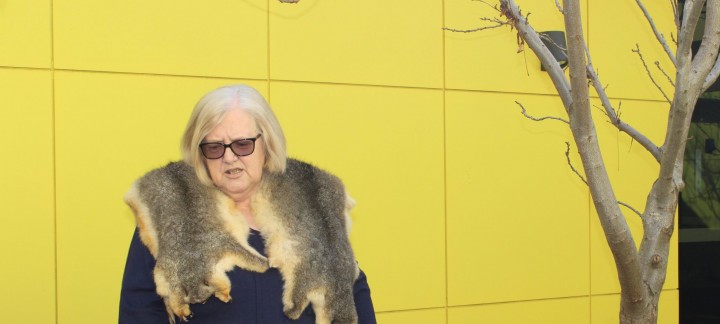Wurundjeri Elder Aunty Di Kerr has performed many Welcome to Country ceremonies at Mercy Health events but her formal duties are just one part of her work. She is also involved in advocacy for Aboriginal and Torres Strait Islander Peoples in the areas of education, childcare, Stolen Generation support and health.
Aunty Di serves on a number of Aboriginal and Torres Strait Islander advisory committees at Melbourne hospitals and women’s health is her particular area of interest. She is often called into these hospitals, on a voluntary basis, to provide Aboriginal patients with cultural support.

Aunty Di Kerr at Mercy Health’s NAIDOC Week celebrations in 2018.
“Often our women are not from these areas and may not understand what clinicians are talking about. That’s why it’s important for an Elder to be with them so they have cultural support and someone to advocate for them. Every woman needs someone with them,” says Aunty Di.
Having Indigenous symbols and artwork in the hospital setting also helps Aboriginal and Torres Strait Islander women to feel at home. “It makes us more at ease,” she says.
The mental health of younger Aboriginal women is another area of concern, which is why she has begun performing coming of age ceremonies for girls when they enter puberty.
“Traditionally, we perform different ceremonies at certain times in a person’s life, but that stopped for a time. A lot of our girls were struggling with mental health issues and we felt like we were failing them, that’s why we started having the coming of age ceremonies,” says Aunty Di.
“The ceremony gives them identity and connection to country. They become stronger, those girls, and they now mentor the younger ones.”
Generational strength and ancestral belonging is something Aunty Di draws on herself. She credits her mother Meryl Oliver and grandmother Martha Nevin for giving her a strong sense of her Indigenous identity.
“Every day now, when I do anything, I always do it in their honour,” she says.
At Mercy Health, we are committed to providing culturally sensitive care for Aboriginal and Torres Strait Islander patients and their families.
If you would like to find out more about Mercy Health’s Aboriginal Programs, visit: health-services.mercyhealth.com.au/patients-and-visitors/supporting-your-visit/aboriginal-programs/
Last reviewed October 29, 2021.



